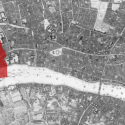From the Act for the Relief of the Poor of 1662, or so-called “Settlement Act” onwards, various pieces of 17th- and 18th- century legislation formally codified entitlement to parochial poor relief by “settlement“. The main ways of gaining a settlement of your own were: completing a formally contracted apprenticeship; at least one year in continuous service; renting a house worth at least £10 a year; paying parish taxes or serving as a parish officer. Many people’s settlements, however, were ‘derived’: a married woman from her husband; children born in wedlock from their parents. But illegitimate children got their settlement from their place of birth. And a new settlement erased previous ones.
In theory, everyone in England and Wales in the 18th century ‘belonged’ to a parish, somewhere. Which was fine… as long as you had a settlement in a place where you actually wanted to be. But the flip side of settlement was removal: exclusion was key to the workings of a locally-based poor relief policy.
Read full post here.

